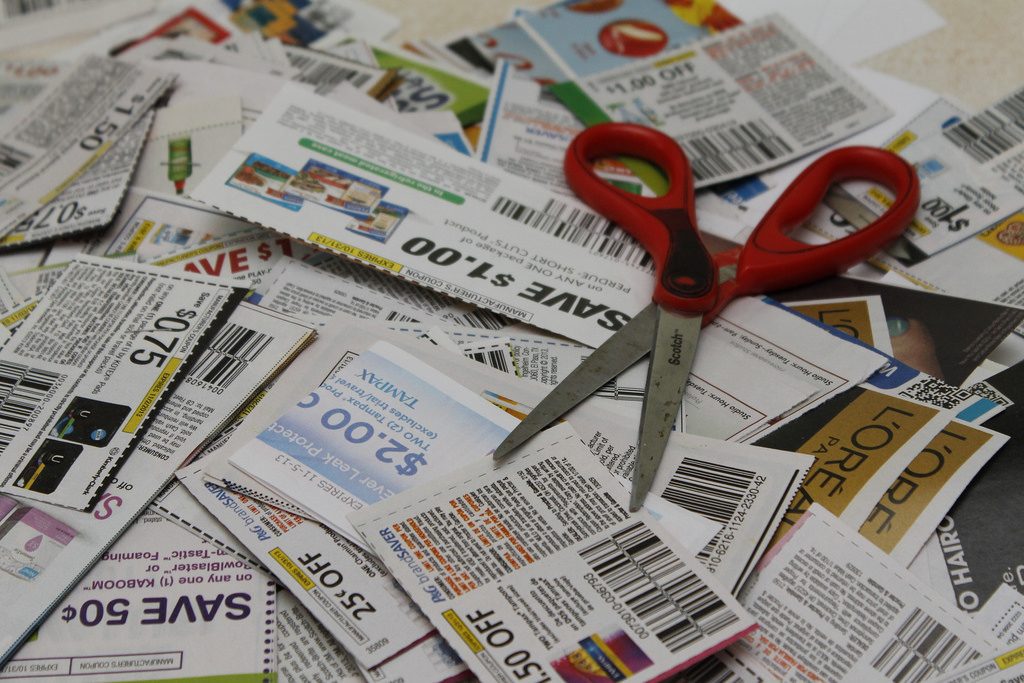
What do you do when you have a coupon that requires multiple purchases of a particular product, but you only want to buy one? You either end up paying full price, or buying more than you had planned in order to get the discount.
But maybe not any longer. A proposed new system would allow you to divvy up the discount with other shoppers, so you each get a share of the savings without having to buy more than you want.
The proposal is described in a newly-published patent application filed by IBM. “Sharing Coupons Based on User Device Location” proposes digital coupons that can be apportioned among multiple users. If you have a coupon that offers $1 off 3 items, for example, and you only buy one item, you’ll get 33 cents off. Then shoppers in the same store will be notified that there are two more discounts associated with that coupon that are up for grabs.
“Often times, a shopper may not want or need multiple items, but may still wish to take advantage of the savings offered by the coupon,” the patent application reads. So in IBM’s proposed system, “a user may purchase a single item, receive a pro-rated discount off the single item, and offer the remaining discount to other shoppers upon the user’s exit of a merchant facility. In this way, multiple users may share a single coupon when a single user is unable to purchase multiple items to redeem a multiple item coupon in its entirety.”
A multi-purchase coupon might show up in your digital coupon account, or it might be offered to you based on your location in the store. So if you’re in the cereal aisle, you might get a notice on your phone that there’s a coupon available for 75 cents off the purchase of three boxes of cereal. If you “partially redeemed the coupon to purchase only one item, the coupon’s attributes may be updated to reflect that the coupon will now provide a discount of 50 cents on two items,” the patent documentation explains. “In this way, the remaining portion of the coupon may be shared with other users when the coupon is not fully redeemed.”
After you use your coupon for your partial discount and leave the store, the proposed system will put that partial coupon back into the queue. Other shoppers who enter the store will be notified that there’s a partially-unused coupon available that they might choose to use.
It’s an interesting idea, though brands that issue multi-purchase coupons do so for a reason – they want you to buy more. If they only wanted you to buy one box of cereal, they could have issued a coupon offering 25 cents off one, instead of 75 cents off three.
Then again, does it really matter if the coupon encourages one person to buy three items, or three people to each buy one? The brand is still selling the same number of products. And it could even work to the brand’s advantage. Instead of selling three discounted items to one shopper, who is now so well-stocked with the product that there’s no need to buy it again anytime soon, they’re selling three discounted items to three shoppers, who will use up the product faster and will be more likely to return sooner to buy more – perhaps at full price.
To ensure that a coupon for 75 cents off three items actually results in three sales, IBM proposes granting the discount only after all of the required items are purchased. So if you buy one item, you won’t get your 25 cents off until someone else buys the other two items and the coupon is fully redeemed. That means you assume the risk of paying full price, if no one else claims the rest of your coupon.
Many couponers complain about the prevalence of coupons that require multiple purchases, since it can be more difficult to save when you have to spend more out of pocket to buy more than you need. But multiple-purchase coupons have actually been on the decline in recent years. According to Inmar’s most recent annual analysis, the average coupon distributed last year required the purchase of 1.37 items, down from a recent high of 1.55 items back in 2012.
If IBM’s idea catches on, however, multiple-purchase coupons may be due for a comeback. And that could turn out to be a good thing – just as long as you don’t mind settling for a portion of the savings.










